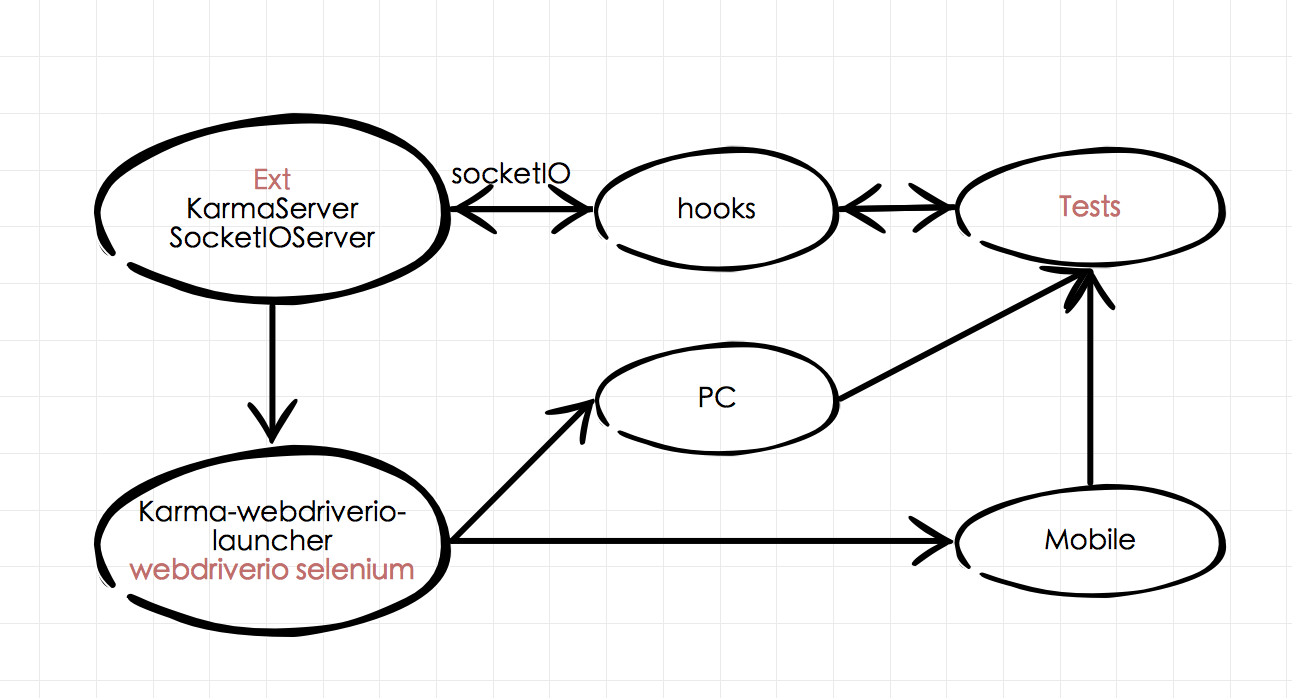karma-event-driver-ext
Introduction
This project aims to integrate webdriverio into karma, for writing event-drive-tests conveniently.
for example, in your browser side test code, call webdriverio api to simulate dragAndMove behavior:
await browser // top-left corner // left-mouse down // mouse-move -100 on the Y-axis // left-mouse up ; // executeLOL Good News!!!
Since version 0.0.13, ext will auto route apis for PC to mobile support apis, for example:
moveToObject(ele, x, y) + buttonDown() => touchDown(ele.left + x, ele.top + y)
more detail@event-driver-hooks.js. Then most of ur tests can run both sides of PC and mobile, Write once, run twice.
How it works
browser in karma-event-driver-ext is just a proxy to receive command. while a webdriverio-like api being called, proxy will format arguments received, for example, convert an argument which type is Element to unique query, then call $apply to sends drive-commands to socket server and wait for executing response.
webdriverio is used to drive the browser and simulate user-behavior.
Tips:
- must not hard refresh karma test page [Chrome is fine, while firefox goes wrong unexpectedly]
- must call $apply, a promise will be returned.
- if Element has no id, event-drivers-hook js will assign a unique id to it automatically.
- aim to simulate event and most webdriverio api support[except $, $$, then and all Window/api]. more api
requirements
- selenium-server-standalone
- chromedriver, more available drivers
- nodejs v6.10.0+
- karma
then must export path to $PATH where u put drivers* or copy drivers* to project directory.
usage
npm install
karma.conf.js
moduleexports = customLaunchers: 'Chrome': base: 'WebDriverio' browserName: 'chrome' name: 'Karma' 'Firefox': base: 'WebDriverio' browserName: 'firefox' name: 'Karma-Firefox' config: browserName: 'firefox' host: '127.0.0.1' // default port: '4444' // default browsers: 'Chrome' // if plugins assigned, should: // since with plugins, karma won't auto load karma-* modules plugins: 'karma-webdriverio-launcher' ...Tests code get webdriverio api:
basic usage
import beforeHook beforeEachHook afterHook browser config from 'karma-event-driver-ext/cjs/event-driver-hooks'; let $serial = browser; // ext using socket-io to communicate with webdriver-io, host & port is changeable ; ;advanced usage
in specified situation, eg: React Component, tests won't start until componentDidMount trigger, More complex, will pause and wait for componentDidUpdate to resume.
always need wrapping a promise:
Ext makes a new way that use $serial api to wrap test in serial, then use browser.$next(status) to start/resume/reject and $apply('applyAndWaitForNext')/$applyAndWaitForNext() to pause test, $serial return a promise which will be resolved if all tests finished.
Instead of wrapping promise, u can:
... { browser; } { browser; } ReactDom; // await or return, $serial return a promise return browser;If browser.$next() ran before $serial, a resolved promise flag will be assigned to browser. then while calling $serial, if there is a resolved promised flag, serial tests will auto start.
Ensure calling beforeEachHook() in beforeEach if using $serial
;And, once test broke, it won't resume util calling browser.$next()
await browser .click(xxx) .$applyAndWaitForNext(); // or .$apply('applyAndWaitForNext'); // pause here, util browser.$next() pausing code wait for next ...Examples
Run Test:
cli
// start selenium-server-standalone
java -jar selenium-server-standalone-3.3.1.jar
// start karma server && event-driver server
node node_modules/karma-event-driver-ext
// or
./node_modules/.bin/karma-event-driver-ext
api: runner.js
let ext init = ; let karmaServer = ; node runner.js
// or
./node_modules/.bin/karma-event-driver-ext runner.js
// or if npm install -g: ^0.0.10, ensure all dependencies installed -g.
// karma-event-driver-ext runner.js
